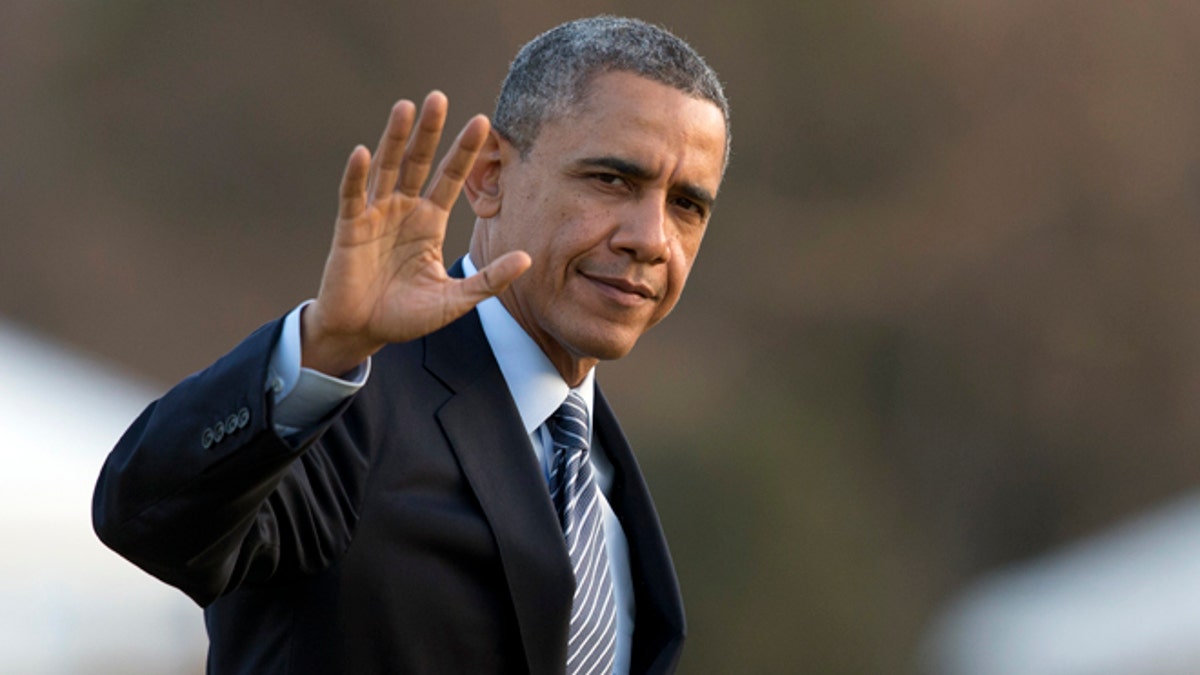
Feb. 7, 2014: President Obama waves as he arrives at the White House. (AP)
President Obama has taken the art of naming donors and other politically connected chums as ambassadors to a new level, despite pledging in 2008 to shake up Washington's back-scratching ways.
A string of gaffes by some of his recent nominees has thrust the Washington practice of appointing donors to foreign posts back into the spotlight. The administration faced difficult questions from the press last week, for instance, after Obama's nominee to Argentina admitted he'd never been there.
But a look back at how Obama's appointments stack up to those of his predecessors shows it's not just business as usual -- if anything, the current president is using diplomatic gigs to reward bundlers and contributors seemingly more than ever.
The American Foreign Service Association, which tracks ambassadorial appointments, has found that in Obama's second term, more than 53 percent of these appointments were political. Less than half have come from the career Foreign Service pool.
"Obama is pushing the envelope," Christian Whiton, former State Department adviser in the George W. Bush administration, told Fox News.
The United States is just about the only major democracy that still uses diplomatic posts to routinely reward political friends. Historically, less than a third of these appointments have been political in nature. Under former President Bill Clinton, 28 percent were political; under former President George W. Bush, that number was 30 percent.
Under Obama, the number has climbed to 37 percent overall. By the time he leaves office, it could well be higher.
Though this is a bipartisan practice, the performance during confirmation hearings of some of Obama's latest picks has raised concerns that the United States may be sending the wrong message abroad.
"Sending donors to be ambassadors -- not that uncommon," Whiton said. "Sending them that have no idea what they're doing or about the regions they're going to, that is new."
The administration stresses that it's too early to say, especially based on scattered confirmation hearing performances, how these nominees would do in their jobs.
"I would encourage people to give those who have had tougher hearings a chance to go to their countries and see what their tenure will entail," State Department spokeswoman Jen Psaki said Friday. "And the judgment can't be made about how effective they'll be or how appreciated they'll be by the government until we have that happen."
She noted that many esteemed U.S. ambassadors have come from outside the Foreign Service career path, including former Vice President Walter Mondale in Japan, and Sargent Shriver in France.
But the question now is whether Obama's picks are coming into their jobs with little connection at all to the country they would represent.
Obama's nominee to Norway, George Tsunis, had a few cringe-worthy moments during his hearing last month. During the hearing, he at one point referred to Norway's president, though the country is a constitutional monarchy. He also downplayed the importance of the country's Progress Party but was sternly reminded by Sen. John McCain, R-Ariz., that the party is part of the center-right coalition government there.
"I stand corrected," Tsunis responded.
Colleen Bradley Bell, a soap opera producer nominated for ambassador to Hungary, also recently struggled to answer what America's strategic interests are in that country.
The exchanges have riled foreign policy experts.
"The Obama administration's appointments suggest that the president isn't being honest when he says that diplomacy is important to him," Henri J. Barkey, Lehigh University professor and former State Department policy staffer, wrote in The Washington Post. "... it's illogical, and insulting, to presume that Norwegians are such wonderful and civilized people -- and hence unlikely to cause any problems with Washington -- that we can afford to send someone on a taxpayer-funded three-year junket to enjoy the fjords."
Some of the prime candidates for appointments, historically, have been bundlers -- people who gather sometimes hundreds of thousands of dollars in donations for the president.
A FoxNews.com review shows that Obama has appointed at least 44 of these so-called bundlers since taking office. That's almost as many as Bush appointed in his full two terms.
The positions awarded to these individuals have remained roughly consistent. Plush posts in western European countries, the Caribbean, and places like Singapore and Canada, often go to the politically connected. France, Great Britain, Germany and Italy are just a handful of the most sought-after jobs. The Japan post, too, is occasionally used to reward political supporters, including most recently Caroline Kennedy.
Tracking by The American Foreign Service Association shows that in some less-popular locations, the ambassador posts for decades have always gone to career diplomats. Armenia, Bangladesh and Mongolia, among others, since 1960 have never had a political donor appointed to serve there.





















